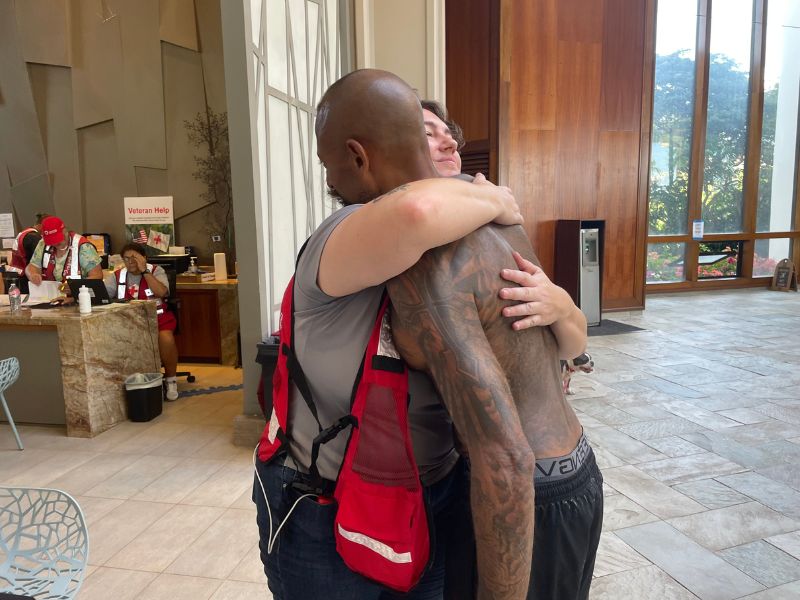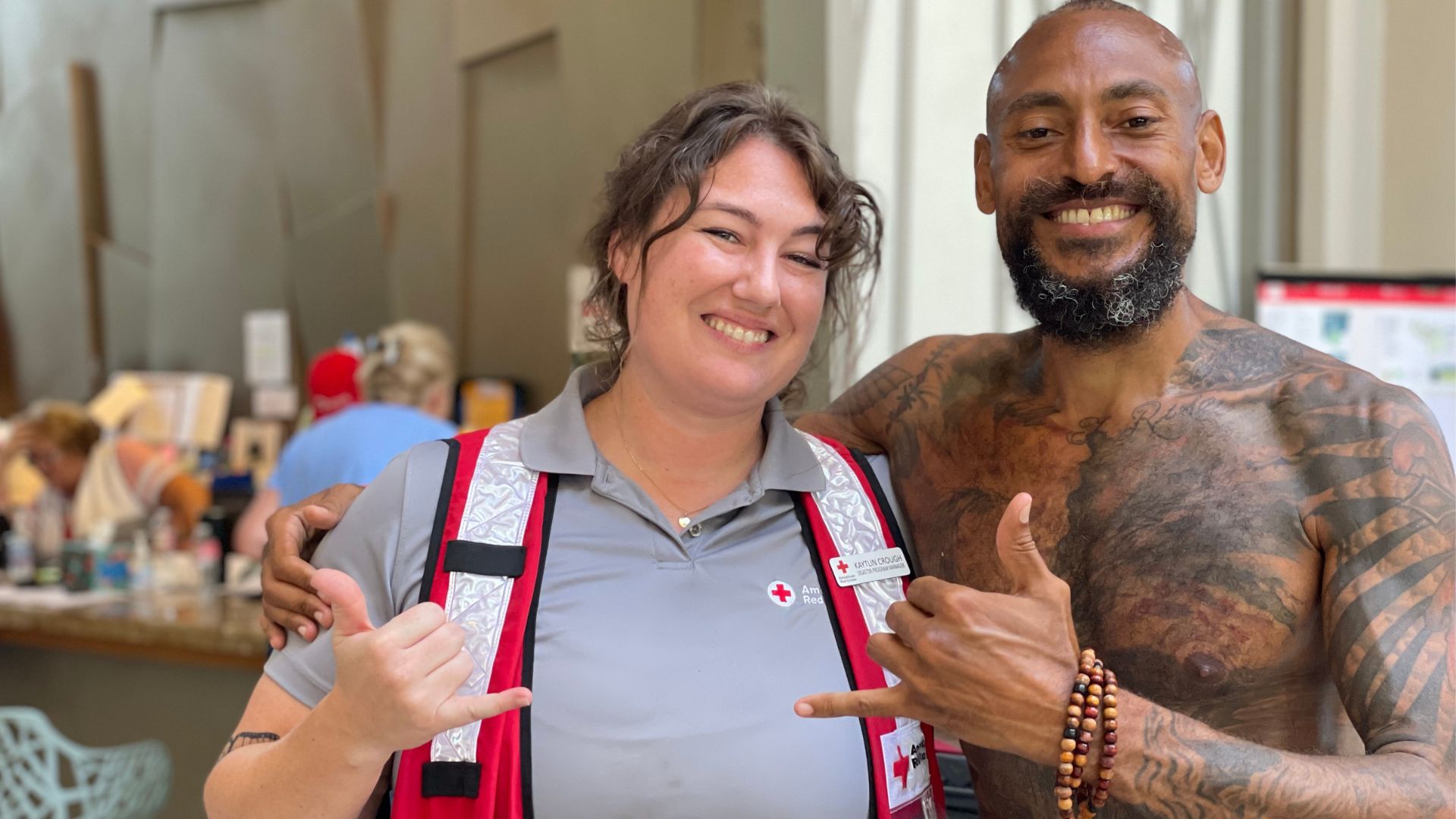In the chaotic aftermath of the wildfires that took Lahaina, residents needed the essentials. The process of registering for aid, being assigned a hotel room, etc., could be hectic and frustrating. Erin was one such survivor and Red Cross volunteer Kaitlyn was fortunately able to provide the support needed.
Erin and Kaitlyn’s story is a powerful example of how the simple act of “talk story” can create a seismic shift in understanding the needs of another and how best to help them as quickly as possible.
Erin’s Story
“This is my first time ever asking for help in my life. And someone from Red Cross chased me down in a parking lot and helped me, and I’m never going to forget that as long as I live.”
Erin Thomas came to an American Red Cross shelter tired and haggard.
His community had a distrust of organizations like the Red Cross and other emergency relief agencies dating back at least as far as the West Maui Fires of 2018. “Everyone was apprehensive to sign up, and even still now people are generally untrusting of the process. I got here late because... I was embarrassed.”
Erin had sent his immediate family to California at the outbreak of the fires to stay with friends and family. He stayed behind to try to get their affairs in order. “I felt like the akamai [Hawaiian for smart, wise, cool] thing to do was just to stay with our community and not ask someone else to take care of us, but then my mental health started to go downhill because I was depending on other people. Even though they’re your friends and they want to help you out, you can only crash on someone’s couch for a while before you feel like a burden. And then when they start going to work and start living their day-to-day life, and you’re just kinda stuck in a trauma zone, it feels like everyone else is making progress and you’re just... not.”
Erin goes on to describe the lack of services available when fending for oneself outside of a shelter, “There’s no services, no mental health support, no meals, no clothes, no people to talk to, nothing. That’s how it was for me, and how it was for a lot of people.”
Erin heard about the application deadline on [deadline date], however, and decided it would be best to finally ask for help before it might be too late. “I was very apprehensive. It was really hard. I got ping-ponged to like 14 different people when I first got here, and I almost quit and almost left. I came up here to the front desk. That’s when I saw Kaytlin. She had a badge on that said supervisor. I think that because I was ping-ponged around so much I was hoping that I could talk to someone in charge. I pulled her aside and said, ‘Hey can I just please talk to you for a minute?’ So, I started sharing my experiences with her.”
“For someone who is kinda apprehensive about asking for help, I guess I just felt like a number in a line. So, I sit down and talk with her, we do the intake, she walks me through the whole process, gives me my Red Cross case number, checks my FEMA number, checks my ID and my address, and says ‘okay you’re in the system, you’ll be getting a call when a room opens up.’”
At this moment, Erin was so used to getting shut down and shuffled off between different agencies that he mistook this period of waiting for a rejection. He became disheartened. “When you finally work up the courage to ask someone for help and they say, ‘We’ll call you if something opens up’, you feel like maybe it was all for not. Maybe that was a negative mindset, but I think that it’s been hard to maintain a positive mindset.”
Even though he had established trust with Kaytlin, he had still grown frustrated and was ready to quit, “I thanked her for her time. I took accountability for if I seemed down or unappreciative or short tempered, I’m just really struggling through this process. Then I left, started walking towards my car, and I started crying.
Kaytlin saw Erin leaving, tears streaming down his face and she made an executive decision. “Suddenly I heard ‘Erin, Erin!’, and it’s Kaytlin. She’s running after me. I thought maybe I left my ID, but she says, ‘I got you a room.’ I just—I gave her the biggest hug I’ve given anyone in a long time because... it was a moment when I felt like I was going to snap and... someone reached out to me.”
Kaytlin made a deal with Erin that he’d share his experiences with a Red Cross mental health worker. “She said there’s a mental health person here on staff that I want you to sit down and talk with. Here’s her phone number.”
“She took me up to my room, opened the door—the key worked. I guess I expected it to not, I turned around and said ‘How long do I have? Today? Tomorrow?’ and she said ‘I don’t know but you’re okay right now. This is the first step to recovery.”
Erin apologized for becoming emotional. “It’s just hard, I don’t ask for a lot. I’ve been out here on my own, I don’t drink, I don’t smoke, I’m an educator, and I see all my students and they’re all here. People are getting on the bus and going across town—You can get on a bus, and you don’t have to pay. You can come here and get a meal. It’s the most support and help we’ve ever seen.”
“We needed Red Cross.”
“I believe in boots on the ground. As a teacher, I help students day-to-day. I’m in the trenches. I support the students who don’t have parents at home. I always saw the Red Cross and I thought it was just a big group, a large corporation, but this has been the first time I’ve been on the receiving end of the Red Cross and you guys have spared no expense. You have us eating quality food, drinking good clear filtered water—I even got Ziplock bags full of toothbrushes and toothpaste. This is my first time ever asking for help in my life. And someone from Red Cross chased me down in a parking lot and helped me, and I’m never going to forget that for as long as I live.”






